Today’s post comes from Brittany Thatcher and Jill Legault of Quetico Provincial Park.
Going meatless on hiking excursions, canoe trips, or any outdoor adventures can be easy, nutritious, and delicious!
Vegetables and vegetable-based products can provide you with the energy and protein needed to lead successful trips.
Nutrition

Without a doubt, tripping in the wilderness can be physically and mentally demanding at times.
Making sure you plan and pack nutritious meals is essential for fueling your physical activity, keeping your body warm, and staying mentally fit on multi-day trips.
Having a complete balance of proteins (beans, eggs, vegetables), carbohydrates (pasta, rice, bread), and fats (oils, nuts, seeds) will ensure your basic needs are met.
Caloric intake on trips is important and may need to be increased compared to your usual intake, due to an increase in physical activity. Carbohydrates make up the majority of this, followed by fats and proteins.
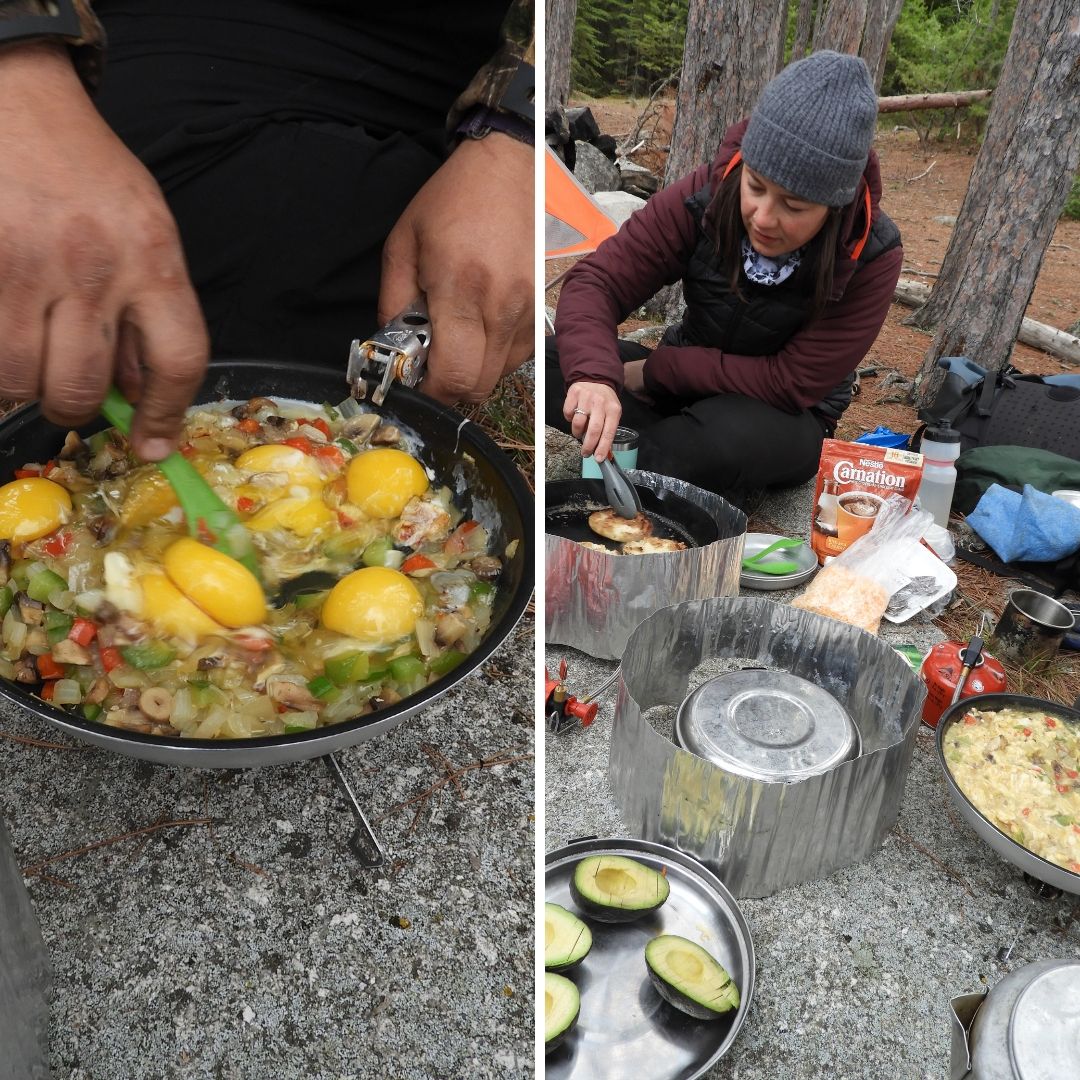
With all of these factors in mind, the possibilities for tasty vegetarian dishes and snacks are endless!
Highest protein foods
Dairy, Grains, Legumes, and Seeds offer great protein sources.

Separately, these groups don’t contain all eight amino acids, but a combination of any two consecutive food groups creates complete proteins (D & G; G & L; L & S). The phrase “Don’t Get Love Sick” is a great way to help remember these pairs in order.
Complete protein combination examples:
- Dairy & Grains: e.g., macaroni and cheese, or dehydrated milk and granola
- Grains & Legumes: e.g., peanut butter on a wrap, beans and rice, or hummus and crackers
- Legumes & Seeds: e.g., seed and nut trail mix
Additionally, choosing high protein vegetables to add into dishes will help boost energy and nutrition.
Some of the vegetables with highest protein are broccoli, spinach, and other dark leafy greens.
Other meat alternatives
The great thing about the following meat alternatives is that they take on the flavour of whatever you are cooking. So you get to be the master of your own flavour creations!
Tofu is a soy-based product, which is high in protein and a staple in many vegetarian diets. Either eaten raw or cooked into stir fries, curries, or soups, it’s easy to prepare and can be cooked with grains (such as rice) to create a complete protein combination.
Dehydrated or vacuum sealed tofu is ideal for every length of trip as it does not need to be refrigerated until opened.
Next time you find yourself in the tofu aisle, consider smoked tofu to add more flavour to dishes.
TVP or Textured Vegetable Protein is also a soy-based product that’s a lightweight and inexpensive meat substitute. Generally pre-dehydrated when purchased, it comes in a variety of shapes and textures, such as flakes or small chunks.
TVP is great in chili, and stews of every kind!
Tempeh is similar to both tofu and TVP, however it’s fermented soybeans and in a more cake-like form. Firm and packed with protein, tempeh has a light nutty flavour and can be thinly sliced, marinated, and pan-fried just like your favourite cut of meat.
Alternatively, it can be crumbled to resemble the shape and texture of ground beef, so it is great in tacos or even backcountry shepherd’s pie!
Nutritional Yeast is deactivated yeast that comes in flakes or powder. It’s a really light way to add in a complete protein. Unlike the other meat alternatives, it does have a strong cheesy/nutty flavour.
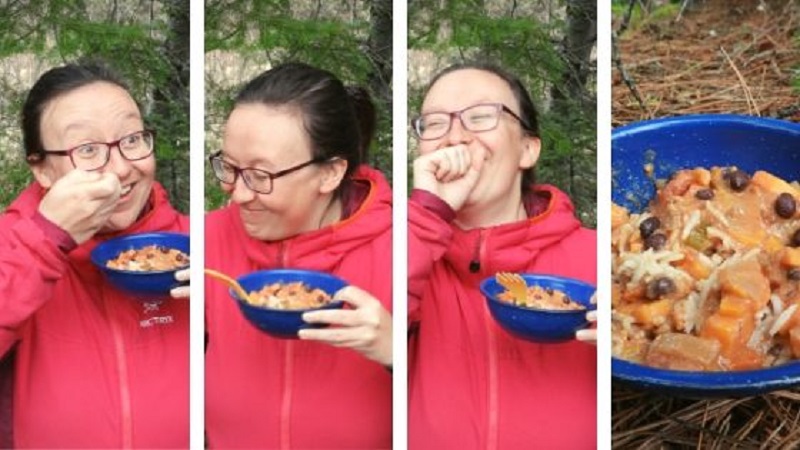
It’s delicious and easy to mix into your next pesto pasta, creamy soup mix, or mac and cheese. You can also shake it onto a backcountry pizza or campfire popcorn. Yum!
Dehydrate!
Dehydrating is a great way to cut down on weight while preventing spoilage.
While you can dehydrate just about anything, there’s a couple of must-try foods that will enhance your backcountry cuisine.
Sauces such as salsa and tomato sauce are a great way to start dehydrating. They’re easy to turn into a leathery texture and turn right back into sauce with some boiling water.
Dehydrating sauces is also perfect for traveling in parks with glass and bottle bans. It’s a great way to add flavour to your eggy breakfast burrito, or cut down on weight for everyone’s favourite campfire pizzas!
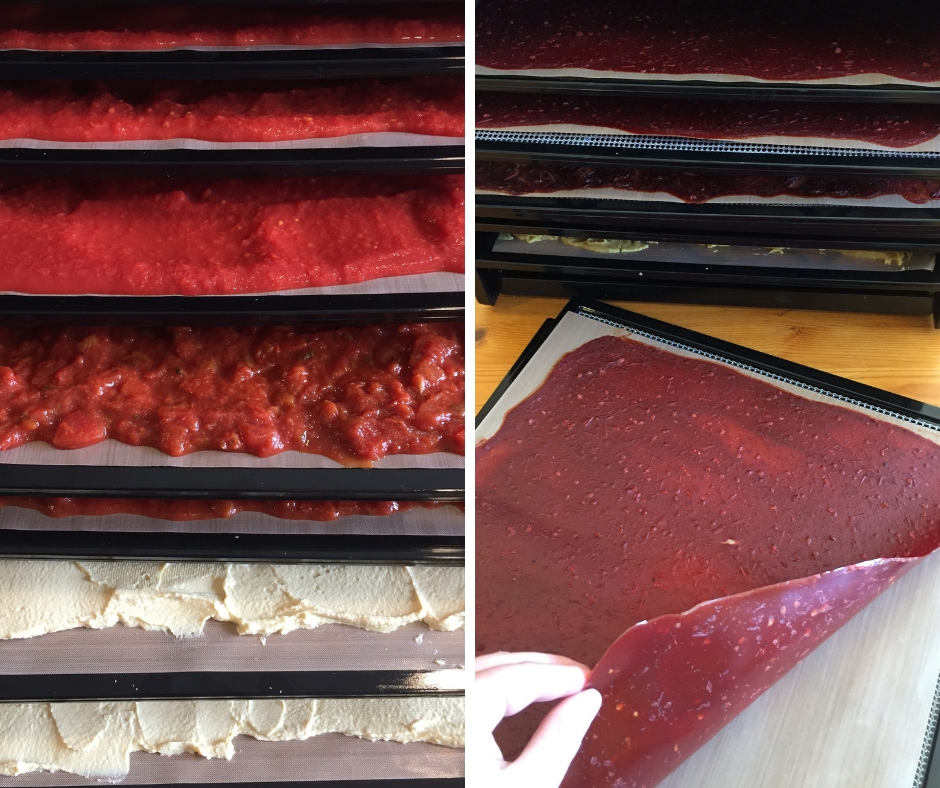
Hummus adds a burst of flavour and protein to camp lunches and snacks. Make the hummus from scratch or simply buy pre-made; both can be dehydrated.
To have a dehydrated hummus in a nice powdered consistency, we find that you need to blend it after dehydration. Dehydrated hummus is also available commercially. Not only is it light, it’s extremely quick to prepare — just add water for dips and spreads!
Mixed vegetables can be thrown into just about every meal to increase nutrition and flavour. A simple method is dehydrating frozen vegetables in bulk.
A dehydrated mix of carrots, peas, and corn, for example, is great in a number of dishes, and is simple to re-hydrate in the same pot while you cook noodles or rice!
The general rule is one cup of dehydrated vegetables to one cup of water.
Full meals like chili or stew are great to dehydrate for the backcountry.
Pre-cooking meals alleviates much of the stress of cooking after a long day of paddling, portaging, or hiking. Having full meals pre-assembled means that the only required step is adding water and heating it up — fast, easy, and efficient.
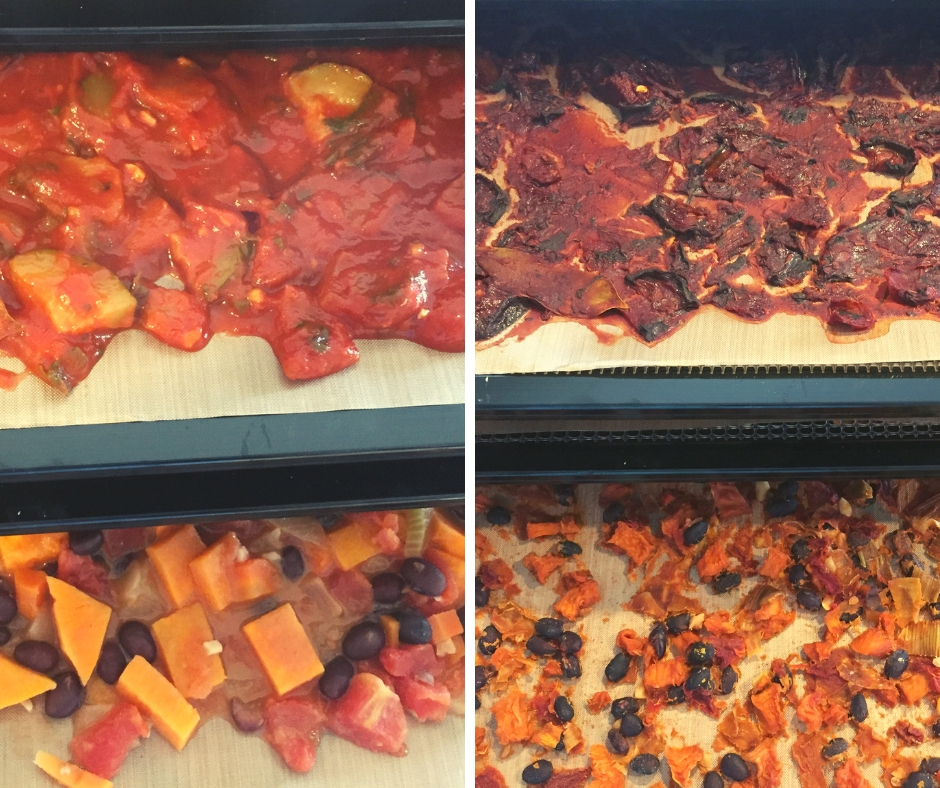
Ready to go veg in the forest? Here are some recipes to try:
Spicy Peanut Noodles Bowl
(servings per person)
- 1 pkg ramen noodles
- 1/4 cup dehydrated vegetable mix
Sauce (pre-mix at home)
- 1 tbsp peanut butter
- 1 tbsp soy sauce
- 1 tsp rice vinegar
- 1 tsp Sriracha
Directions: Boil dehydrated vegetable mix and ramen with flavour packet until cooked. Add sauce and enjoy!
Curried Lentil Dahl
(servings per person)
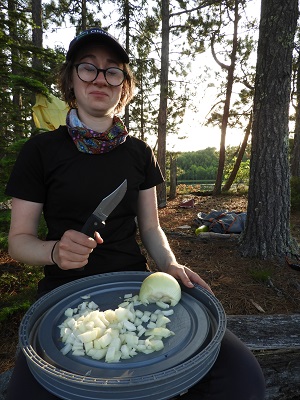
- 1/4 cup split red lentils
- 1/2 cup instant rice
- 1 cup coconut milk (dehydrated)
- 1 tbsp oil
- 1/2 onion
- 1 tsp curry powder
- 1 tbsp pre-made tamarind sauce
- dash of salt
Directions: Cook instant rice as directed and leave to stand. Boil split lentils until tender (about 5-7 minutes) and set aside. Sauté onions in oil, then add curry powder, salt, coconut milk and lentils. Simmer for 10 minutes. Serve over rice with tamarind sauce.
Dehydrated Spanish Rice
(servings per person)
- 1/4 cup TVP
- 1/2 cup instant rice
- 1/4 cup dried bell and jalapeño pepper
- 1/4 cup dried corn
- 1/4 cup dried salsa
- 1/4 cup shredded cheese
Directions: Combine all ingredients except cheese in a pot. Add 1 1/2 cups of water. Let stand for 5 minutes. Light stove and bring to a boil for 1 minute. Remove from stove and let it stand for another 10 minutes. Stir in cheese and enjoy.
Extra Cheesy Pesto Pasta
(servings per person)
- 1/2 pkg. of egg noodles
- 1/2 cup of pesto
- 1/4 cup of shredded cheese
- 1/4 cup of pine nuts
- 2 tbsp nutritional yeast
Directions: Cook noodles as directed. Add dehydrated vegetable mix to boiling water a minute before the noodles are done. Drain. Add pesto, cheese, nuts and nutritional yeast. Yum!

Lazy & Lightweight Shepherd’s Pie
(servings per person)
- 1 cup instant mashed potatoes
- 1/4 cup TVP
- 1/2 cup dehydrated vegetable mix
- 1 tbsp of your favourite herb mix (oregano, basil, garlic & onion powder, salt & pepper)
Directions: Combine TVP and vegetables in a bowl. Carefully pour ¾ cup of boiling water into the bowl. Let stand for about 5 minutes. Cook instant potatoes in separate pot as directed. Combine all ingredients. Enjoy the fluffy hot goodness!
